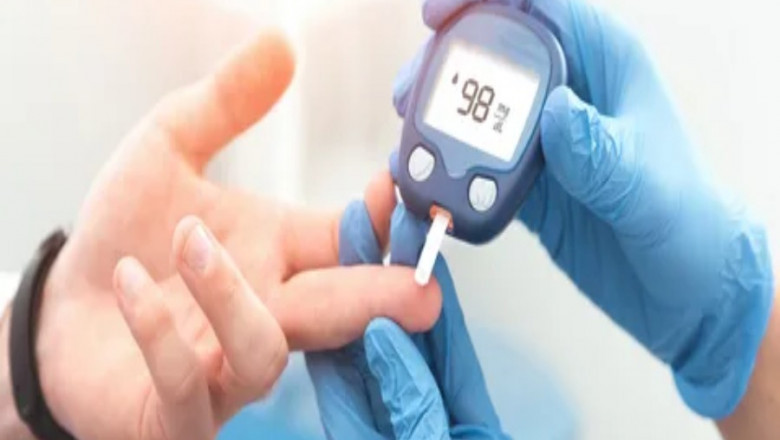views
What is Diabetes?
Diabetes is a chronic condition that affects how your body metabolizes sugar (glucose), which is the main source of fuel for your body’s cells. With diabetes, your body either doesn’t produce enough insulin (Type 1 Diabetes) or doesn’t properly respond to the insulin it produces (Type 2 Diabetes). Insulin is a hormone produced by the pancreas that allows sugar to enter your body’s cells and be used for energy. Without enough insulin, the glucose stays in your bloodstream. Over time, high blood sugar levels from diabetes can damage nerves, blood vessels, eyes, kidneys and the heart.
Diet and Exercise are Key
Diabetes Care a healthy diet and exercise regimen are crucial for managing diabetes. It is important to choose foods low in sugar and high in fiber to help control blood sugar levels. Opt for whole grains, fruits and vegetables, lean proteins and healthy fats. Limit refined carbs from sweets and baked goods. A registered dietitian can help develop a personalized meal plan tailored to individual health needs and lifestyle. In addition to diet, regular exercise like walking, swimming or biking provides many benefits for diabetes care such as lowering blood sugar and reducing the risk of complications. Aim for at least 30 minutes of activity on most days of the week.
Monitoring Blood Sugar
Self-monitoring blood glucose (SMBG) with a glucose meter allows diabetics to track how food, medication, exercise and stress affect blood sugar levels. Testing should be done before meals, 2 hours after meals and before bed to guide treatment decisions. Continuous glucose monitoring (CGM) systems provide round-the-clock readings via a sensor worn on the body. Both methods help determine if insulin doses need adjustment or if care strategies need modification. Documenting numbers gives a complete picture for discussing management with healthcare providers. SMBG and CGM provide critical feedback for optimizing diabetes control.
Medications for Insulin Deficiency
Several medication options exist to replace or supplement insulin for those with Type 1 or Type 2 Diabetes. For Type 1, injections of synthetic insulin are required to survive. For Type 2, oral pills like metformin may sufficiently lower blood sugar at first. But as the disease progresses, some Type 2 patients also need insulin injections or newer injectable medications like GLP-1 receptor agonists in addition to oral medications. Working closely with doctors ensures any regimen supports individual health targets and lifestyle needs. Adherence to prescribed treatment reduces complications risks over the long-term.
Managing Comorbidities and Complications
In addition to blood glucose control, it is vital for diabetics to get recommended vaccines, screenings and tests that evaluate risk for developing related health problems. This includes regular eye exams to monitor for retinopathy, kidney function tests if there is a history of high blood pressure or kidney disease, and foot exams for anyone with neuropathy or a foot injury/infection. People with diabetes are also more prone to gum disease and need dental cleanings twice yearly. Heart disease and stroke risk can be lowered through cholesterol, blood pressure and smoking cessation management in accordance with clinical practice guidelines.
The Emotional Aspects of Diabetes Care
Adapting to diabetes can involve personal adjustments emotionally and psychologically as well. Individual support enables a more positive outlook and enhances self-care abilities. Seeking counseling may help address underlying stress, unhealthy coping, disordered eating or poor adherence that develops over time. Participating in a diabetes education program and joining a peer support group offers encouragement and solutions from others living with diabetes. Reach out if feelings of low mood, worry or burnout interfere with successful management. Taking care of mental health is an integral part of addressing the whole-person impacts of chronic disease.
Coordinated Healthcare Team Approach
No one faces diabetes alone - a healthcare team approach provides the most effective support system. Key players include primary care physicians, endocrinologists, registered dietitians, certified diabetes educators, nurses, pharmacists, eye doctors, podiatrists, dentists and mental health professionals. Establishing care with an endocrinologist is especially important for those with Type 1 or insulin-dependent Type 2 Diabetes. An endocrinologist specializes in hormonal conditions including diabetes and can coordinate monitoring and treatment optimization across the multi-disciplinary care team. Individualized guidance empowers positive self-care and minimizes health risks over a lifetime.
In the successful diabetes care requires balancing glucose control with personalized lifestyle strategies. Multifaceted support addresses medical, nutritional and emotional aspects through a coordinated care team approach. With diligent self-management and treatment adherence tailored to individual needs, individuals with diabetes can enjoy healthy, fulfilling and complication-free lives.
About Author:
Money Singh is a seasoned content writer with over four years of experience in the market research sector. Her expertise spans various industries, including food and beverages, biotechnology, chemical and materials, defense and aerospace, consumer goods, etc. (https://www.linkedin.com/in/money-singh-590844163)






















Comments
0 comment